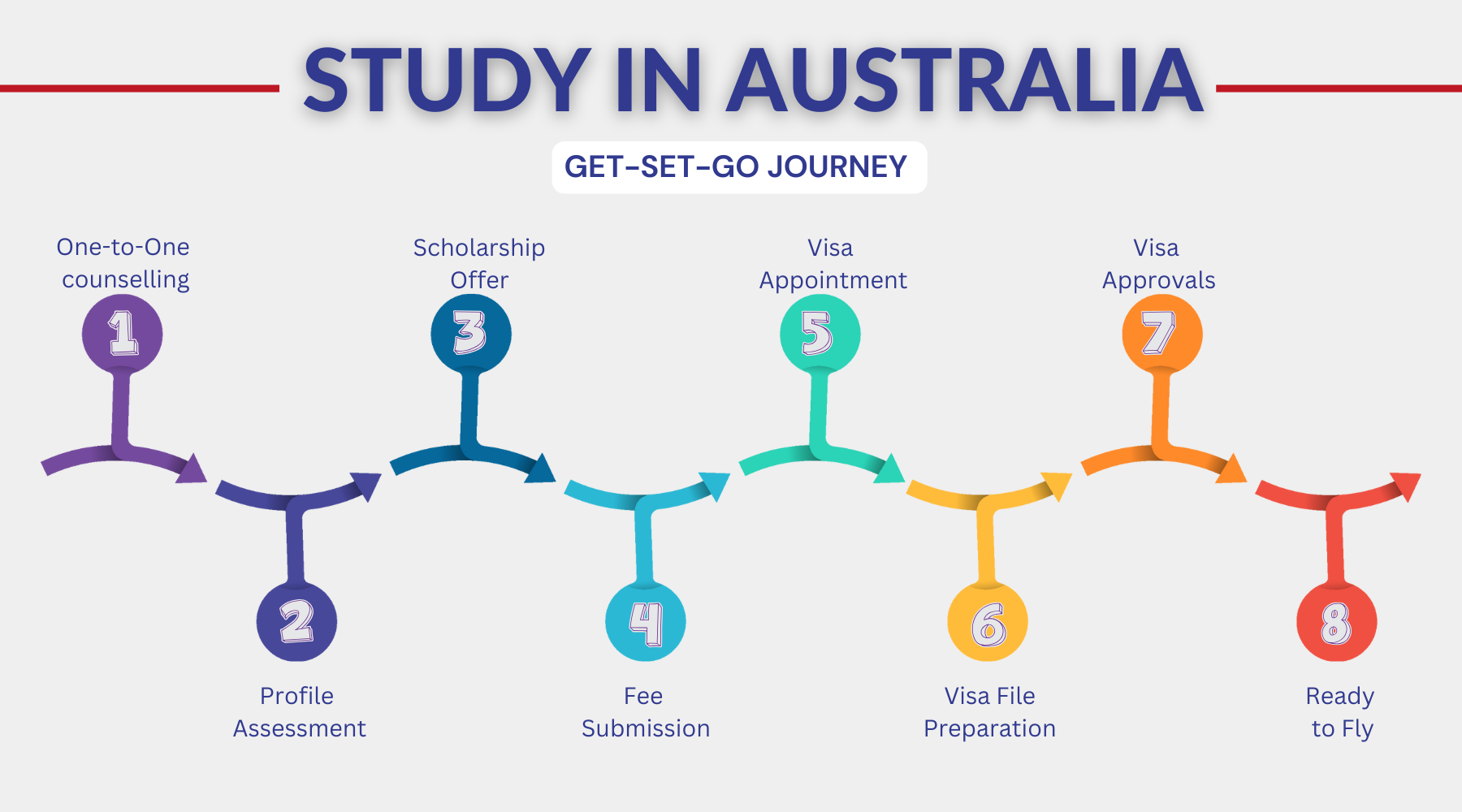
About Australia
Australia is a vast and diverse country located in the Southern Hemisphere, known for its stunning landscapes, unique wildlife, and vibrant cities. It is the world’s sixth-largest country by land area, featuring everything from arid deserts like the Outback to lush rainforests and beautiful coastlines, including the iconic Great Barrier Reef. Australia is home to a rich Indigenous culture dating back over 65,000 years, as well as a multicultural society shaped by immigration. Major cities such as Sydney, Melbourne, and Brisbane offer world-class attractions, while the country’s laid-back lifestyle and love for sports, like cricket and Australian Rules Football, reflect its national identity. With a strong economy, high quality of life, and breathtaking natural wonders, Australia remains a top destination for travelers and a unique place to live.
Top Universities
Why study In Australia?
Study in Australia is one of the top three study destinations globally, attracting over 700,000 international students annually. With its world-class universities, high quality of life, post-study work opportunities, and stunning landscapes, Australia offers an unbeatable study experience.
This comprehensive guide covers everything you need to know about studying in Australia, including:
✔ Top-ranked universities & academic excellence
✔ Popular courses with strong job prospects
✔ Scholarships & affordable education options
✔ Work rights during & after studies
✔ Post-study work visa & PR pathways
✔ Student life & cultural experiences
1. Australia Has 7 Universities In The Top 100 (QS World Rankings 2024)
- Australian National University (ANU) – #1 in Australia
- University of Melbourne – Best for research
- University of Sydney – Leading in medicine & law
- University of Queensland (UQ) – Strong in engineering
- UNSW Sydney – Top for business & technology
2. Globally Recognized Degrees
- Australian degrees are highly respected worldwide, especially in fields like:
- Medicine, Engineering, Computer Science
- Business, Environmental Science, Creative Arts
3. Innovative Teaching & Research
- Practical, industry-focused learning (internships, labs, fieldwork).
- Strong research culture (Australia ranks #1 in research citations).
4. Work While Studying
Part-time work: Up to 48 hours per fortnight (24 hrs/week) during semesters.
Full-time work: Unlimited hours during semester breaks.
✔ Minimum wage: AUD $23.23/hour (one of the highest in the world).
5. Post-Study Work Visa (PSWV)
- Bachelor’s/Master’s graduates: 2-4 years work visa (depending on degree).
- PhD graduates: Up to 6 years work visa
Frequently Asked Questions (FAQ) study In Australia
1. Why choose Australia for higher education?
Australia is home to globally ranked institutions offering high-quality education, a diverse and inclusive environment, and opportunities for personal and professional development.
2. What are the major intakes in Australian universities?
- February (Primary intake)
- July (Secondary intake)
- November (Limited programs and institutions)
3. What are the English language proficiency requirements?
Most institutions require one of the following:
- IELTS: Overall band 6.0 or 6.5 (with no band less than 5.5 or 6.0)
- PTE Academic / TOEFL iBT / Cambridge are also accepted
4. Are international students allowed to work during their studies?
Yes. International students may work up to 48 hours per fortnight during academic sessions and full-time during scheduled breaks, subject to visa conditions.
5. What are the popular fields of study in Australia?
- Health and Nursing
- Information Technology
- Business and Management
- Engineering
- Hospitality and Tourism
6. What is the estimated cost of studying in Australia?
- Tuition fees: AUD 15,000 – AUD 35,000 per year (depending on program and institution)
- Living expenses: A minimum of AUD 24,505 per year (as per visa requirement)
7. Is a post-study work visa available?
Yes. Graduates may apply for the Temporary Graduate Visa (Subclass 485), which allows them to stay and work in Australia for 2 to 4 years, depending on the course and location.
8. What are the key requirements for a student visa (Subclass 500)?
- Valid passport
- Confirmation of Enrolment (CoE)
- English language test result
- Proof of sufficient funds
- Genuine Temporary Entrant (GTE) statement
- Overseas Student Health Cover (OSHC)
9. Can family members accompany the student?
Yes. Dependents such as spouses and children may accompany the student. Spouses of Master’s or PhD students may be eligible to work full-time.
10. How can Worldify® assist with the process?
Worldify® provides:
- Expert counseling and university selection
- Application and admission assistance
- Visa guidance and documentation support
- Financial and scholarship advisory
- Pre-departure and accommodation support
